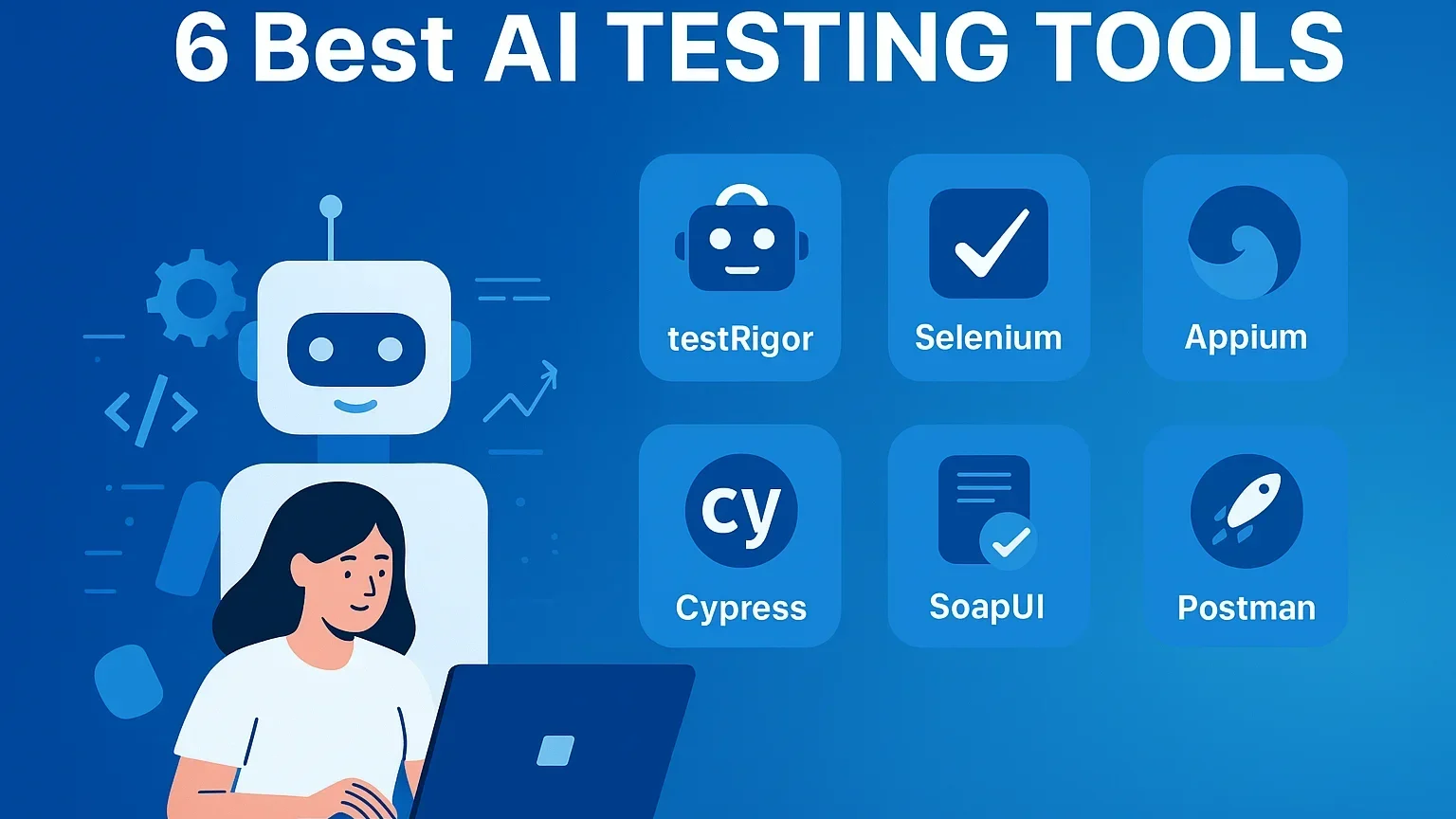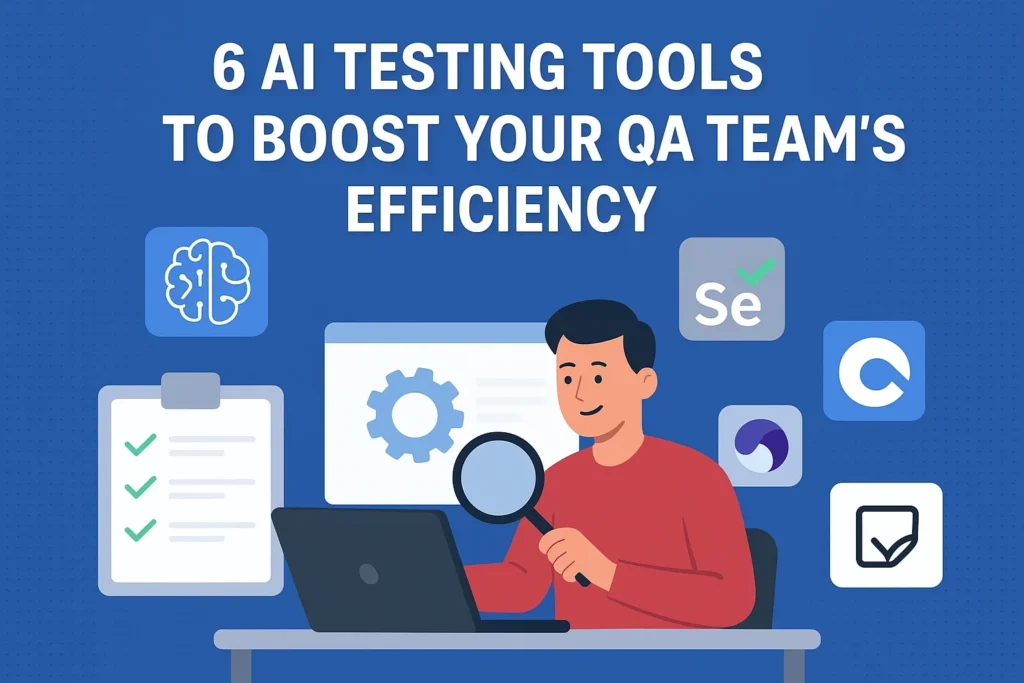Software testing plays a critical role in ensuring that digital products meet functional, usability, and reliability expectations. However, as applications grow in complexity and release cycles accelerate, traditional QA approaches increasingly struggle to keep pace.
Large test suites become difficult to maintain, manual regression testing slows delivery, and defects are often discovered late in the development lifecycle. While human testers bring a valuable user perspective and domain understanding, they are still limited by time, scale, and the risk of oversight.
This is where artificial intelligence testing tools are beginning to reshape how QA teams operate. Rather than replacing testers, AI augments QA workflows by improving coverage, reducing repetitive maintenance, and enabling earlier, continuous validation. In this article, we examine six AI-powered and AI-assisted testing tools commonly used in software testing, along with where they add the most value.
Why AI Testing Tools Matter for QA Efficiency
AI testing tools are not simply about automation speed; they change how QA workflows are structured. When applied correctly, they allow testing activities to shift earlier in development and operate continuously rather than episodically.
Reduced test maintenance
Modern AI-assisted tools use self-healing mechanisms that adapt to UI and locator changes. This significantly reduces the time spent fixing brittle scripts and allows teams to scale test suites without proportional maintenance overhead.
Faster regression cycles
AI-driven test generation and execution enable continuous regression testing as part of CI/CD pipelines. Instead of running large manual test cycles before releases, teams can validate changes incrementally.
Expanded test coverage
By removing execution bottlenecks, testers can focus on edge cases, visual inconsistencies, and unusual user flows that are often missed during manual testing.
Cross-functional collaboration
Low-code and no-code testing tools enable non-technical stakeholders, such as product managers and business analysts, to contribute to quality validation, improving feedback loops.
Scalable execution
Cloud-based AI testing platforms support parallel test execution across environments, helping QA teams keep pace with rapid release cycles.
6 Best AI Testing Tools

There are multiple kinds of Artificial intelligence testing solutions available in the market today. Each has unique strengths and weaknesses. There’s no one-stop solution for all product types that a single tool can offer. Each is suited to different scenarios and requirements. Let’s explore the six most commonly used Validation tools along with their features.
testRigor
testRigor is an AI-driven test automation tool designed to reduce reliance on technical scripting expertise. It allows testers to write test cases using natural language, which the platform translates into executable tests using built-in generative AI.
This approach is particularly useful for teams aiming to reduce test maintenance overhead and involve non-technical contributors in QA activities.
Key Features:
- Natural language input
- Self-healing capability
- Scalability
- Cross-platform support
- Test simulation
Selenium
This is another widely used software automation tool. It is an open-source testing framework well-suited to web applications. This has been in the market for more than a decade and allows teams to create robust functional tests. Although Selenium is not fully AI-driven, it will enable AI integration with other solutions to enhance its functionality. The primary drawback of this tool is that it requires testers to have technical expertise because they must write their own test scripts.
Key Features:
- Community-driven ecosystem
- Supports multiple programming languages
- Compatible with various browsers and platforms
- Parallel execution of tests in multiple environments
Appium
Appium is an open-source automation framework well-suited for testing mobile applications. It enables testers to create and reuse the same test code across multiple platforms, including Android, iOS, and Windows. Like Selenium, Appium can be integrated with AI plugins to enhance its capabilities.
Also Read: The Ultimate Guide to Choosing the Best Mobile Devices for Testing in 2026
Key Features:
- Integration with CI/CD tools like Jenkins.
- Cross-platform compatibility
- Supports multiple programming languages
- Test cases can be reused across multiple platforms
Cypress
Cypress is a modern front-end automation tool that has gained significant popularity in recent years. While it is not AI-based, it features AI-driven automation, including automatic waiting and faster debugging, which enhance the testing experience.
Key Features:
- Rich resources like plugins and integration for API testing and visual testing.
- Supports cross-browser testing
- Automatic waiting
- User-friendly
SoapUI
When it comes to API testing, SoapUI is one of the most popular choices for software testers. It allows testing for SOAP and REST services. Teams can perform functional, regression, integration, and security testing using this tool. Through AI-driven plugins, it ensures the complete validation of your API’s performance.
Key Features:
- Complete coverage of API testing
- Data-based testing, where it can test APIs with different datasets
- Security testing
- Performance testing
- No-code testing
Postman
Although initially just an API development tool, Postman has evolved into a comprehensive platform for API development and testing. It provides deeper insights through AI-based analysis, thereby enhancing test coverage and generating more effective test cases. It has become a go-to choice for most companies that want to not only test their API send requests but also make their APIs more robust after rigorous testing.
Key Features:
- Reusable workflows
- No-code test generation and execution
- Mock servers
- Enhanced collaboration between teams
Conclusion
Software testing has undergone significant evolution in recent years, particularly with the introduction of AI. Artificial intelligence testing solutions are not just another trend in software testing but have become an indispensable part of it. Tools such as TestRigor, Selenium, and Appium can be used individually or in combination, depending on your application’s requirements, budget, and expertise. Each enhances a different aspect of your quality assurance. When selected thoughtfully, they can play a crucial role in improving the efficiency of your QA process.












